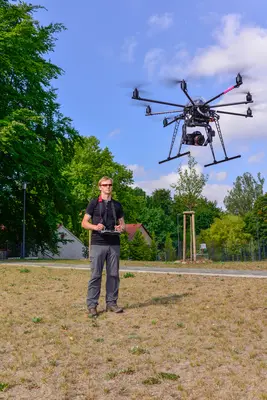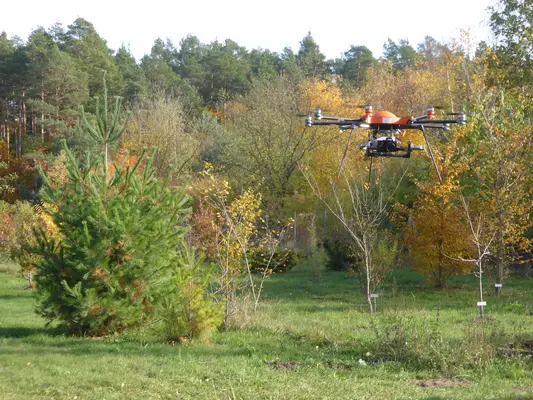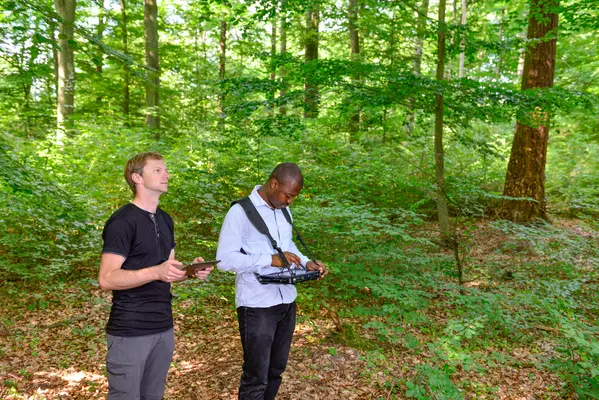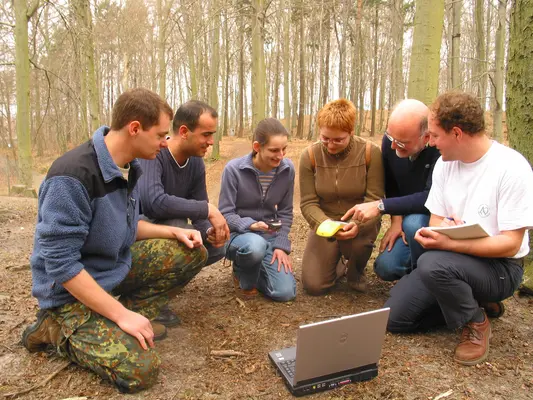Individual study contents
The programme consists of four semesters. A total of 30 ECTS shall be completed each semester, consisting of 18 ECTS of mandatory modules and an additional selection of elective modules. Further academic content like specialization modules are eligible recognized by the European Credit Transfer System. This results in a total of 120 ECTS for the master's programme FIT.
Modules per semester
The first semester covers principles of innovative Forest-IT and environmental information technology.
The module consists of the parts Principles of forest data structures and principles of GIS and Remote Sensing. Students gain fundamental knowledge about forest data structures and their spatial and digital representation. They become familiar with IT based methods and techniques. Students get an applied introduction to the use of geospatial data and technology in ecological and sustainable forest management and applied forest technology and more broadly in environmental sciences. Students understand principal methods of geospatial spatial data.
Students deploy algorithms conceptually and implement them using a programming language. Students use computer programming techniques to analyze datasets from practical applications in environmental science and forestry. They develop programs that handle different data types and structures, perform calculations and represent the results visually.
The module consists of Forestry data structures and spatial data models and Environmental spatial data analysis.
Students know the theoretical fundamentals of data concepts and are able to plan and to implement databases for spatial data processing. They define and describe the important data structures and data types involved in the creation of spatial data models and identify the processing techniques required by different types of data.
Students perform statistical analyses of environmental spatial data. Students are able to select appropriate statistical procedures and tests to find structures and relations in the data and to justify statements.
The second Semester takes place at Warsaw University of Life Sciences and focuses on the application of information technologies (IT) in forest and environment related subjects and forest management topics. In addition to the three compulsory modules, you choose two further compulsory elective modules.
- Sustainable forestry
- Data Processing and programming
- Data colletion and processing technology
Offers of the University of Warsaw Elective Modules
Possible elective modules could be:
- Scientific Principles: Presentation and planning skills
- Scientific Principles: Language and social skills
- Forest biometry, biomass and tree ring analysis
- Principles of landscape ecology
- LiDAR data processing and geostatistical methods in forestry
- Sustainable forest management & forest products
- Specialisation module
During the third semester at either location FIT students pursue an independent research project framed by a range of elective modules. Students choose two elective modules.
The Project consists of a scientific or technical research project and a scientific internet colloquium.
Students are enabled to plan and accomplish a particular research project of moderate size and consolidated their senior level of graduate academic maturity concerning their thematic focus. Students are able to discover new areas of IT applications, extend and manifest their capacities for accomplishing scientific work including academic writing and reviewing scientific papers in an online virtual seminar.
Possible elective modules could be:
- Advanced remote sensing innovations (ARSI)
- Advanced LiDAR data analysis
- Big Data Analytics
- Machine Learning and Data-Driven Modelling
- Innovative Forest Management Methods
Possible elective modules could be:
- Innovative economy, policy and social science in forestry
- Natural resources & conservation
- Information & mathematical models
- Environmental monitoring
Possible elective modules could be:
- Learning by doing: Adaptive Management
- Forest Pest & Diseases
- Genetic Resources Conservation an Molecular Markers
Students can also choose modules from other forestry-specific Master's programmes for their individual specialisation, e.g. Forestry System Transformation.
During the fourth semester at either location students work on their Master thesis supplemented by one further elective module.
Students acquire further skills in interdisciplinary scientific work. They are able to evaluate research projects and to communicate results to expert and professional audience.
Students obtain own research results while solving and discussing a scientific problem.
Students present the research results of their master thesis and are able to defend its underlying assumptions, methodologies, and robustness of the key findings.
Possible elective modules could be:
- Applied Big Data Analytics
- Advanced Programming
Possible elective modules could be:
- Climate change impacts on plant growth and crop yield: non-invasive monitoring methods
- Advanced data mining techniques
Students can also choose modules from other forestry-specific Master's programmes for their individual specialisation, e.g. Forestry System Transformation.
FAQ study contents
During the modules and the research project of the third semester, a practical part is always integrated into the curriculum.
You learn to handle different programmes that deal with FIT topics. The studies are enriched with many excursions to the forest, to the measuring stations or to the marteloscope areas.
Yes, the FIT team provides detailed information on the FIT FAQ page on moodle. After enrolment, students are given access to this page.
The FIT degree programme in Eberswalde and Warsaw combines the acquisition of specialist knowledge and technical skills very skilfully. Especially the practical implementation and the theoretical modules distinguish FIT from other Master's programmes.
Mansour Mahamane
Student Forest Information Technology




